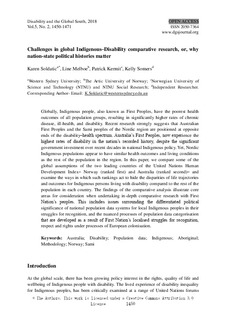| dc.contributor.author | Soldatic, Karen | |
| dc.contributor.author | Melbøe, Line | |
| dc.contributor.author | Kermit, Patrick Stefan | |
| dc.contributor.author | Somers, Kelly | |
| dc.date.accessioned | 2019-04-25T09:29:07Z | |
| dc.date.available | 2019-04-25T09:29:07Z | |
| dc.date.created | 2018-08-13T08:08:05Z | |
| dc.date.issued | 2018 | |
| dc.identifier.citation | Disability and the Global South. 2018, 5 (2), 1450-1471. | nb_NO |
| dc.identifier.issn | 2050-7364 | |
| dc.identifier.uri | http://hdl.handle.net/11250/2595438 | |
| dc.description.abstract | Globally, Indigenous people, also known as First Peoples, have the poorest health outcomes of all population groups, resulting in significantly higher rates of chronic disease, ill-health, and disability. Recent research strongly suggests that Australian First Peoples and the Sami peoples of the Nordic region are positioned at opposite ends of the disability–health spectrum. Australia’s First Peoples, now experience the highest rates of disability in the nation’s recorded history, despite the significant government investment over recent decades in national Indigenous policy. Yet, Nordic Indigenous populations appear to have similar health outcomes and living conditions as the rest of the population in the region. In this paper, we compare some of the global assumptions of the two leading countries of the United Nations Human Development Index– Norway (ranked first) and Australia (ranked second)– and examine the ways in which such rankings act to hide the disparities of life trajectories and outcomes for Indigenous persons living with disability compared to the rest of the population in each country. The findings of the comparative analysis illustrate core areas for consideration when undertaking in-depth comparative research with First Nation’s peoples. This includes issues surrounding the differentiated political significance of national population data systems for local Indigenous peoples in their struggles for recognition, and the nuanced processes of population data categorisation that are developed as a result of First Nation’s localised struggles for recognition, respect and rights under processes of European colonisation. | nb_NO |
| dc.language.iso | eng | nb_NO |
| dc.publisher | The Critical Institute | nb_NO |
| dc.relation.uri | http://hdl.handle.net/11250/2582277 | |
| dc.rights | Navngivelse 4.0 Internasjonal | * |
| dc.rights.uri | http://creativecommons.org/licenses/by/4.0/deed.no | * |
| dc.title | Challenges in global Indigenous-Disability comparative research, or, why nation-state political histories matter | nb_NO |
| dc.type | Journal article | nb_NO |
| dc.type | Peer reviewed | nb_NO |
| dc.description.version | publishedVersion | nb_NO |
| dc.source.pagenumber | 1450-1471 | nb_NO |
| dc.source.volume | 5 | nb_NO |
| dc.source.journal | Disability and the Global South | nb_NO |
| dc.source.issue | 2 | nb_NO |
| dc.identifier.cristin | 1601338 | |
| dc.description.localcode | © The Authors. This work is licensed under a Creative Commons Attribution 3.0 License. | nb_NO |
| cristin.unitcode | 194,67,90,0 | |
| cristin.unitname | Institutt for sosialt arbeid | |
| cristin.ispublished | true | |
| cristin.fulltext | original | |
| cristin.qualitycode | 1 | |

